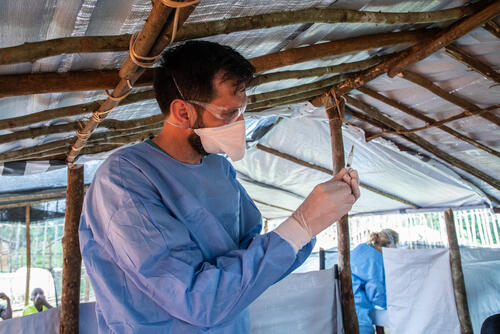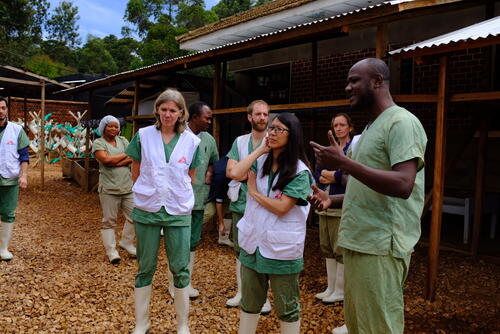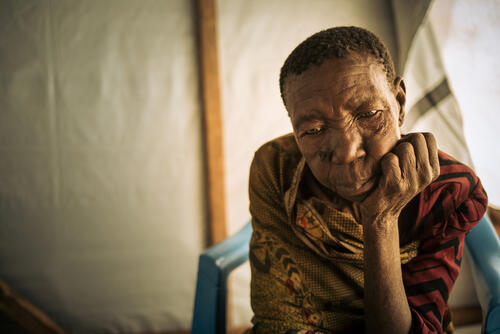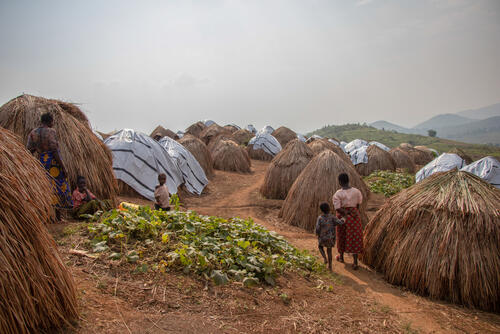- The current Ebola outbreak has a mortality rate comparable to the West Africa outbreak, despite new treatments and vaccines being available.
- Not enough eligible people have been vaccinated, one reason for which is WHO’s strict limits on the number of doses used in the field.
- We call for the establishment of an international, independent committee to transparently manage Ebola vaccine stocks and their use.
Paris/Goma – More than a year into the ongoing Ebola outbreak in northeastern Democratic Republic of Congo (DRC), the disease has killed over 2,000 people. The mortality rate in this outbreak is around 67 per centWHO cumulative data as at 18/9/2019 show 2,108 deaths over 3,150 cases, with a mortality rate of 67% over the course of the epidemic., which is comparable with the mortality rate in the 2014-2016 West Africa outbreak, when neither therapeutic treatments, nor a vaccine, were available. While a highly effective vaccine is now able to offer some protection, the number of people vaccinated is not enough. The pace of vaccination activities is too slow and only a fraction of the eligible population is benefiting from this critical toolBased on the experts’ recommendation to vaccinate between 150 and 200 contacts for each confirmed Ebola patient, the 3,100 total confirmed cases reported so far should have resulted in between 450,000 and 600,000 people being vaccinated, more than double the actual number. In August 2019, with 261 confirmed cases, only 21,300 people were vaccinated (81 people per confirmed case)., says Médecins Sans Frontières (MSF). One reason is the opaque management of the vaccine supplies by the World Health Organization (WHO), who imposes strict limits on the number of doses deployed in the field. MSF urges for an independent committee to be formed to manage Ebola vaccination programmes.
It’s like giving firefighters a bucket of water to put out a fire, but only allowing them to use one cup of water a day.Dr Natalie Roberts, MSF Emergency Coordinator
Thanks to the efforts of the DRC Ministry of Health and WHO, close to 220,000 people have been vaccinated with rVSV-ZEBOV, an investigational vaccine produced by Merck that has shown very high levels of efficacy. This number remains largely insufficient though, as shown by the fact that the outbreak keeps returning to areas that have been supposedly covered by vaccination.
Vaccination – especially of healthcare workers – can be scaled up
“We think that upping the pace of vaccination is necessary and feasible: at least 2,000-2,500 people could be vaccinated each day, instead of 500 – 1,000 people as is currently the case” says Dr Isabelle Defourny, MSF director of operations. “We have a vaccine that is proven to be safe and effective; we have teams ready to be deployed; there is no problem with the cold chain; there are enough doses to cover the current needs and to allow for an extension of vaccination coverage, as recently confirmed by Merck, the vaccine manufacturer; and when people are aware of the vaccine, the vast majority of them want to be vaccinated.”
“Yet WHO is restricting the availability of the vaccine in the field and the eligibility criteria for people to be vaccinated for reasons that are unclear,” Dr Defourny continues. “Even when it comes to frontline health workers – a known, easily reachable population – in a hotspot of the outbreak such as Beni, almost a third of them reported they have not been vaccinated.”
Every day we see known contacts of confirmed Ebola patients who have not received their dose despite being eligible for vaccination.Dr Natalie Roberts, MSF Emergency Coordinator
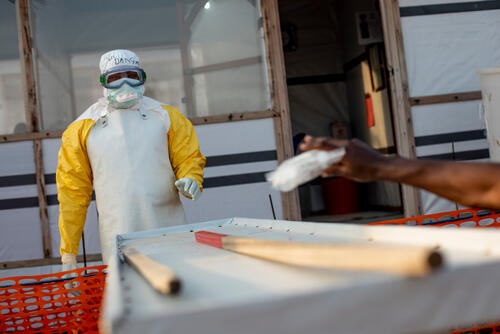
New treatments available, yet disease hotspots keep flaring up
Despite the new vaccine and new therapeutic treatments available in this outbreak that can dramatically increase a person’s chances of survival, the outbreak continues to rage a year on, having so far claimed over 2,000 lives, around two-thirds of those who have been diagnosed with the disease.
As many as 40 per cent of the deaths are represented by people who died at home before they could even be identified as patients. These rates have been relatively stable over timeData by the Analysis Cell in Goma (Ministry of Health, CDC, Epicentre) for August 2019 show that this rate was still over 60% during the month and 43% of deaths were community deaths.. While the pace of transmission appears to have slightly ebbed in recent months, some areas have been active hotspots for over a year now and other hotspots have become active after extended periods without reporting new cases.
“Community mistrust and resistance have often been pointed out as the major obstacles in the fight against Ebola,” says Dr Natalie Roberts, MSF Emergency Coordinator. “In reality, people would seek medical care at the onset of symptoms if we told them loud and clear that they can be cured with treatments recently provenIn August 2019, the independent Data and Safety Monitoring Board (DSMB) for the trial of four investigational agents for the treatment of Ebola virus disease recommended that the study be stopped and that all future patients be randomized to receive either REGN-EB3 or mAb114, because preliminary results indicated that those two products provided a greater chance of survival than the other two. to greatly increase their chances of survival.”
WHO is restricting the availability of the vaccine in the field and the eligibility criteria for people to be vaccinated for reasons that are unclear.Dr Isabelle Defourny, MSF director of operations
“They would also come to be vaccinated in greater numbers if more people were aware they can be protected from the virus by a vaccine proven to be highly effective against EbolarVSV-ZEBOV vaccine has been shown to be safe and highly effective against the Zaire strain of the Ebola virus following a “Phase III” clinical trial in Guinea, during the 2014-2016 outbreak. This vaccine was recommended by the Strategic Advisory Group of Experts on Immunization (SAGE) for use in Ebola outbreaks caused by the Zaire strain of the virus.”, Dr Roberts continues. “We need to stop blaming communities for their own deaths and make sure more people have access to treatments and vaccines.”
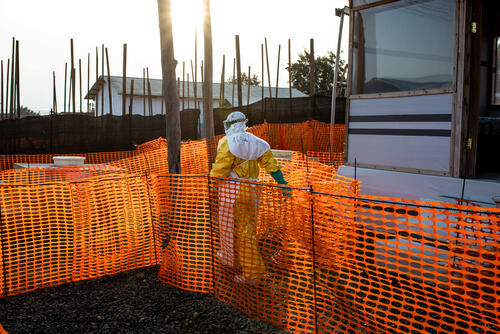
WHO tightly controlling vaccine supplies and access
MSF’s efforts to expand access to vaccination, in collaboration with the Ministry of Health and according to the recommendations of the Strategic Advisory Group of Experts (SAGE)SAGE is the principal advisory group for WHO for vaccines established in 1999. in May 2019, have been frustrated by the tight controls on supply and eligibility criteria imposed by WHO. MSF vaccination teams have often been forced to remain on standby in North Kivu, waiting to receive a handful of doses reserved to people on a pre-defined list.
“Time is of the essence in an outbreak: medical teams should be able to rapidly provide treatments or vaccines based on what they see on the ground,” says Dr Roberts. “If a mother has been caring for her sick child who is then diagnosed with Ebola, not only do we want to diagnose and treat the child, but also we also want to provide the mother with post-exposure prophylaxis that could potentially prevent her from developing the disease, and vaccinate her whole community so that if she does get sick, they will have already developed immunity.”
We need to… make sure more people have access to treatments and vaccines.Dr Natalie Roberts, MSF Emergency Coordinator
“But our capacity to carry out real-time assessments and react accordingly is severely undermined by a rigid system which is hard to comprehend,” Dr Roberts says. “It’s like giving firefighters a bucket of water to put out a fire, but only allowing them to use one cup of water a day. Every day we see known contacts of confirmed Ebola patients who have not received their dose despite being eligible for vaccination.”
Such restrictions seem unjustified: rVSV-ZEBOV vaccine has demonstrated a good safety profile and a high level of protection against the virus in a Phase-3 clinical trial in Guinea in 2015. In the absence of regulatory approval, the Congolese Ministry of Health and WHO allowed the vaccine to be used under an ‘Expanded Access’ framework. Manufacturer Merck recently stated that in addition to the 245,000 doses already delivered to WHO, they are ready to ship another 190,000 doses if required, and that 650,000 additional doses will be available over the next six to 18 months.
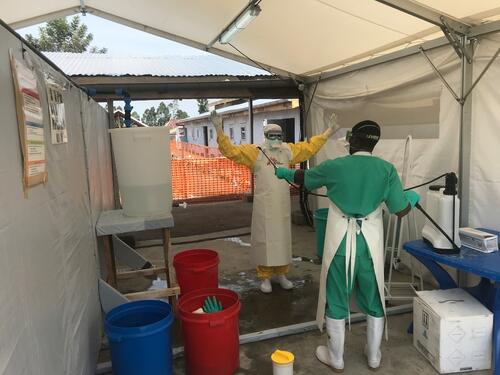
Independent coordination committee needed to manage vaccines
“To allow for the best possible use of experimental tools in an outbreak context, transparency is key,” continues Dr Roberts. “How can we support the Congolese authorities in using these tools, how can we expect the Congolese people to trust a system that is not even transparent to front-line health workers like MSF?”
Médecins Sans Frontières calls for the urgent creation of an independent, international coordination committee, based on the model of the International Coordination Group created in 1997 composed of MSF, the International Federation of Red Cross, UNICEF and WHO, which proved successful in managing massive meningitis, cholera and yellow fever outbreaks with limited vaccine supplies. The committee would bring partners together to improve coordination on vaccination, increase transparency in stock management, share data, foster an open dialogue with the manufacturers and ultimately ensure that the vaccine is provided to all those most at risk of being exposed to the virus.
MSF has been active in the Ebola intervention in north-eastern DRC since its declaration on 1 August 2018. MSF teams have been involved in several activities including provision of care to confirmed and suspect Ebola patients, vaccination of frontline workers, strengthening of infection prevention and control measures and community outreach. They have also been working with numerous health facilities in North Kivu and Ituri in order to support access to general healthcare for the population during the Ebola epidemic.



